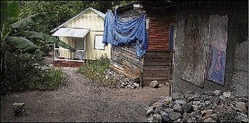The River People - Living on the edge; Hope River Valley home to hundreds for more than 20 years
Published: Sunday | November 29, 2009


Photos by Ian Allen/Photographer
LEFT: These children enjoying themselves in the Hope River in St Andrew.
RIGHT: Shacks sitting in the bed of the Mammee River, also in St Andrew.
Howard Campbell, Gleaner Writer
A TREK along the banks of the Hope River in rural St Andrew would pose a challenge for any amateur hiker.
Extreme sports enthusiasts, however, would lick their lips at the thought of negotiating its slippery terrain, jagged rocks and egg-shaped boulders.
Andrew Barnes is not into hiking or daredevil sport. The diminutive, 40-year-old gardener has lived in the Hope River Valley for 12 years.
Originally from Trench Town, south St Andrew, he said his parents moved to August Town when he was six years old and when it was time to branch out, he found the rustic brush of the Hope River Valley a "suitable" location to build a home.
The zinc and board structure is not much to look at. It has one room, and although there is no space for hygienic purposes, Barnes insists he does not use the river to bathe or to relieve himself.
Shelters elsewhere
His older brother, Steve, lives a matter of metres away in another shack. He says whenever there is unstable weather, such as Tropical Storm Gustav last year, they seek shelter at their sister's home in August Town.
The Hope River land is owned by the National Water Commission, but Barnes says he has never been asked to leave.
"Mi always hear seh dem pass through an' seh people fi move, but mi neva si dem yet," he told The Sunday Gleaner.
Barnes is among hundreds of people who live on the banks of the Hope River.
Their origins are diverse: many hail from nearby August Town and surrounding communities, but others trekked from as far away as northern Trelawny to settle on idle land.
Their presence, one August Town resident complained, is threatening the welfare of legitimate homeowners. According to the man who declined to be identified, "They are an environmental disaster waiting to happen."
Water and Housing Minister, Horace Chang, agrees. He called the informal settlements in the Hope River Valley one of his ministry's "biggest problem areas".
Gustav's angry torrents killed two persons in the Hope River Valley and displaced several families. It is expected that early next year more than 100 of those affected will be relocated to lands in West Albion, St Thomas, and live in homes provided by the Food For the Poor agency.
"Once we identified the land, they readily agreed to move," said Chang.
In the 1970s when squatter settlements sprung up across Jamaica, persons flocked the Hope River Valley and built homes. Many lay down roots in communities called Dread Heights (now Bedward Gardens) and still call the area home.
The communal setting was ideal for nature-loving Rastafarians who lived there. Three of them, Lacelle Bulgin, Albert Craig and Cecil Spence, found international fame during the 1990s as roots-reggae group Israel Vibration.
Not squatting
Sixty-three-year-old Stanley 'Patrick' Thomas is an elder of the Hope River Valley. He moved there from Duan's Vale, Trelawny, in 1977 and raised a family in a conventional three-bedroom concrete house in Bedward Heights.
Thomas says, unlike many of the persons who live in the Mammee River region, residents in Bedward Heights are not squatters. Most of them, including him, lease the land they live on.
Like the administration of P.J. Patterson, the government of Bruce Golding has vowed to clamp down on informal settlements through the water and housing ministry's squatter-settlement unit.
That means people like Andrew Barnes' days living in the Hope River Valley may soon be numbered. He says if the day comes that he is removed, he will accept his faith.
"Dat woulda be God works, yuh nuh, but fi the time being, mi nuh have nuh wey fi go," he said.










